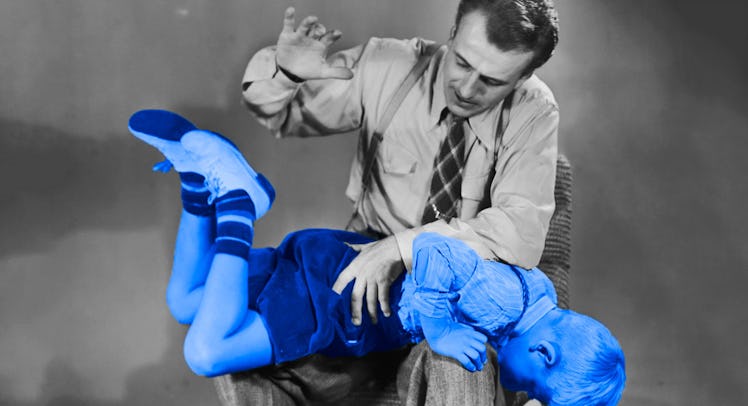Should I Spank My Child?
There will come a time when a kid’s behavior pushes you to the brink. You might even contemplate spanking. Here’s some advice: Don’t.

Let’s start with the hottest water-cooler talk these days in discipline: A new study in the Journal of Pediatrics reports that children who grew up being spanked are more likely to engage in date violence. Physical aggression leads to physical aggression, research increasingly suggests. It may be no huge surprise, then, that in the last several years, the United Nations Committee on the Rights of the Child has convinced 51 countries to outlaw the practice of corporal punishment. And yet, many nations — and parents — still support the idea of spanking to varying degrees. In the U.S., the most recent data collected through the University of California Berkeley census suggests that three in four parents believe that it is sometimes necessary to strike a child for discipline.
So, should you? Nope, no, not a chance. “We know that children who were spanked are more violent in relationships,” says Tom Limbert, author of Dad’s Playbook: Wisdom for Fathers from the Greatest Coaches of All Time. “Spanking teaches kids that you can solve things with force and violence.” Not the message you’re trying to impart. On the other hand, “if you want to teach children to solve things by respecting and talking to others, then respect and talk to them,” says Limbert. “Involve them in the solution, offer choices, and give reasons why certain behaviors are not acceptable.”
Does this mean your kids will turn into model sons and daughters overnight? Of course not. But understanding the implications of their behavior will go a long way to helping your little rebel rouser get with the program.
Of course, that all sounds good now. But most of us know the feeling of being at our wit’s end, staring down a child who has pushed buttons we didn’t even know we had, and really grappling with the idea of giving the kid a good smack. (If you pretend you’ve never had that thought flash through your head, you’re either lying to yourself or your child is an angel.) What to do when the steam is coming out of your ears? “Absolutely parents should take a time-out,” says Limbert. “There is nothing wrong with stepping away for a minute; you are modeling emotional intelligence and regulation for your child.”
But won’t backing off send the wrong message to your misbehaving child that she’s “won”? Not if you do it thoughtfully. “Start by stating clearly, ‘I am upset and need to calm down right now,’” says Limbert. “Tell her, ‘I’m going to take a time-out and we can talk in a bit when we can listen to each other.’” Take 10 minutes, an hour, or even the rest of the afternoon to cool off. Revisiting the discussion when you and your child are calmer allows for a more meaningful exchange. Your child will learn that angry feelings can be sorted out by talking, and that physically acting out against another person is never the right solution, no matter how mad you feel inside.
This article was originally published on